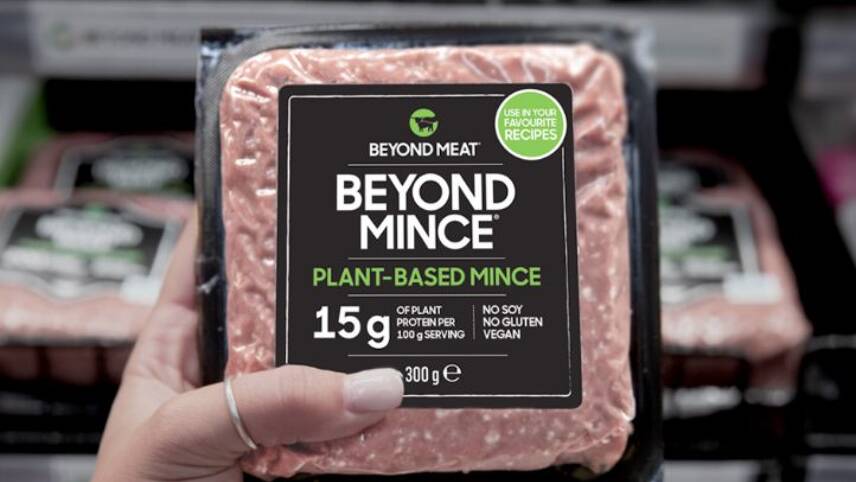Register for free and continue reading
Join our growing army of changemakers and get unlimited access to our premium content

Image: Beyond Meat
Conducted by impact investment firm Blue Horizon and finance giant MSCI, the research assessed 485 companies across the food sector, including supermarkets and other food retailers, suppliers of agri-food products, distributors and manufacturers.
It found that almost half (46%) of the firms are now selling some form of plant-based or alternative proteins. However, only 9% of the firms saw these product categories accounting for more than 5% of their total sales.
The only pure-play business in this market included in the assessment was Beyond Meat, which supplies meat-free products to brands including Starbucks and Burger King. The largest food firm classed as a leader in the report was Nestle, which has patents for more than 100 plant-based product lines.
MSCI and Blue Horizon found that, in general, companies with interests in the booming plant-based and alternative proteins markets were more likely to have set verified science-based emissions reduction targets, covering their value chain as well as their direct operations. 15% of companies involved in plant-based meat and dairy alternatives had verified science-based targets, compared with 2% for firms without involvement.
This former cohort of companies were also more likely to be disclosing Scope 3 (indirect) emissions (7% compared to 2%) and to have implemented emissions reduction programmes across the supply chain (40% compared to 15%).
Because of this leadership on decarbonisation – as well as the avoidance of other risks relating to animal agriculture – firms with a strong involvement in the plant-based and alternative protein space had, on average, 95% lower value chain risk levels in terms of US dollars, the research found.
If the rest of the sector fails to catch up, the report warns, billions of dollars of risk could crystalise for the global food sector in the coming decades.
The report details likely losses for the sector at warming trajectories of 3C, 2C and 1.5C. Each trajectory is based primarily on national policies and international climate agreements, but also accounts for the level of likely decrease in the consumption of meat and animal products.
Shifting down from a 3C trajectory to a 2C trajectory, the report forecasts, would avoid risks to the food sector worth $97bn by 2100. The avoidance gap between 3C and 1.5C is steeper still, at $295bn.
Last year, the FAIRR Initiative’s policy director Helena Wright penned an exclusive blog for edie outlining the environmental benefit of transitioning to plant-based proteins – for businesses, and consumers. You can read that article in full here.
Veganuary
In related news, the Veganuary campaign has revealed this week that it has had more sign-ups for 2022 than in any previous year, with more than a week still left to go.
The campaign posted on Tuesday (18 January) that it has hit 600,000 official participants for 2022, up from the 580,000 participants in 2021.
Veganuary challenges participants to eat only vegan foods for 31 days, with a view that they will change their dietary habits in the long term.
“It is incredibly exciting to be marking the biggest Veganuary on record, but it is not surprising,” said the campaign’s head of communications Toni Vernelli. “As more people become aware of the incredible impact our food choices have on the health of our planet, attitudes towards eating vegan are changing and so are our diets.”
According to YouGov, 8% of UK adults already describe their diet as vegan.
Veganuary is also documenting a surge in workplaces helping their staff to eat plant-based, and in launches of plant-based food items from large brands (McDonald’s, KFC and Marks & Spencer to name a few) and from new, smaller brands.
Among the new brands launching this month is GreenForce, which is making its debut in the UK following successful launches in Germany, Austria, Switzerland, Belgium and the Netherlands. Greenforce sells pea protein mixes which customers can add water to, to make things like burgers. This format, it claims, can help reduce food waste in the home.
“The UK is an incredibly important market for the plant-based world,” said Greenforce founder Thomas Isermann. “The vegan, vegetarian and flexitarian population in the country is growing rapidly, so it’s crucial that we provide healthy, planet-friendly and tasty food for them.
“But it’s not just them we are focussing on – we are also focussed on meat-eaters. We have more than eight years of research behind us, helping us develop a range of products that should satisfy the tastebuds of anyone, whether they are vegan, veggie or neither.”
Sarah George


Please login or Register to leave a comment.